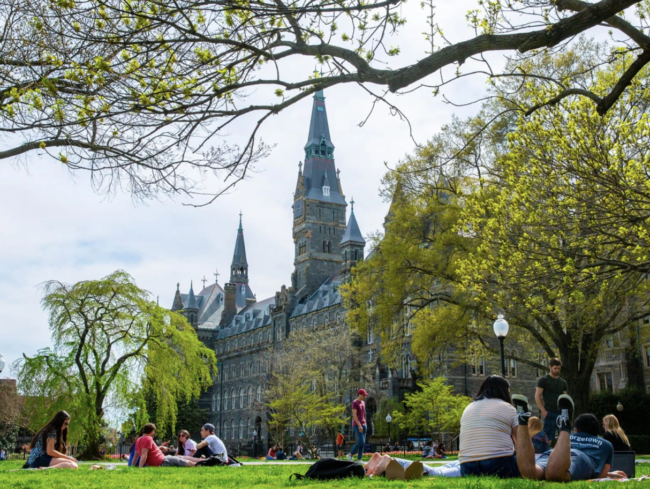This past summer, I went to Georgetown University for one week to study international relations. This included listening to lectures by professors at Georgetown, visiting an embassy (my group went to the Israeli Embassy), discussing various topics, and engaging in an interactive simulation. The program was an overall great experience, where I made friends and got to experience a bit of what college is going to be like. The program took a deep dive into the many challenges presented in the international system, as well as covering the general definition and purpose of the international system.
To summarize, we learned that the international system is a set of actors interacting under a certain type of structure. An actor in the international system can be anything from a state to a company to an individual person – essentially any entity that holds an important role in global affairs. These actors are operating under a changing structure. It is not unanimously agreed upon what structure we live in today, but during the Cold War, for example, the general consensus was that the world operated under a mostly bipolar world order – with the majority of states (but not all) either siding with the West or siding with the Soviet Union.
One of the most pressing questions that have faced and continue to face the leaders trying to bring peace and justice to the entire world is the question of ethics. Given that many of the nations of the world have drastically different outlooks as to right and wrong, establishing an international basis that we can all agree upon is incredibly difficult. In 1948, a UN vote on the Universal Declaration of Human Rights was held, and many saw this as the world finally agreeing upon a basic set of human rights. No country voted against this, but eight abstained – including the Soviet Union, its allies, South Africa and Saudi Arabia. On top of that, the laws of this declaration, which include many things from freedom of religion to the right to equal pay for equal work, are completely absent from many of the world’s countries, including some of those that voted for this resolution. Learning that there is no real agreement about human rights internationally was a bit frightening to hear.
At Georgetown, we also learned about some of the more specific issues that exist within international relations. For me, the most fascinating of which was the subject of nuclear weapons. Since the end of World War II, the mere threat of nuclear weapons has hung heavily over many of the world’s most major conflicts. At the program, we learned that our current international system (and the system since the end of WW2) is in large part shaped by the usage of something known as “nuclear diplomacy.” This essentially means that the threat of nuclear weapons is a powerful enough deterrent that it is used frequently in international relations. An example of this is Putin’s threat of using tactical nuclear weapons should red lines be crossed regarding Russia’s territorial sovereignty during the war in Ukraine. This example also outlines a specific aspect on which nuclear diplomacy and coercion in general rely – credibility. Putin’s threat only works because it’s known that he has the capability to use these weapons and it is believed that he might actually be willing to use them.
A second issue, an extremely important one, and one which the world is able to collaborate much more on, is the issue of global health. At the program, I learned a lot more about the structure of and the challenges faced by the world’s attempts at the advancement of health. While great progress has been made in this sphere, such as in the fight against AIDS, there are still countless issues we face, both with diseases and with disagreements about the structure of the global health system. Structurally speaking, one challenge is the debate about whether wealthier countries such as the United States should allocate almost all of their resources at home, or whether they should place global health as a priority. A complicated topic, outside of the recent pandemic, this isn’t something that, in my opinion, we hear enough about.
This summer program taught me a lot about a wide range of topics and subjects that all relate back to international relations. The ones I mentioned here are merely the tip of the iceberg. Both focusing on specific and more broad matters, this program covered a lot for just one week of learning. The discussions of ethics and many of the dilemmas faced by international actors made me feel not far at all from my Fieldston home. I would definitely recommend this summer program to anybody interested in the field of international relations.









